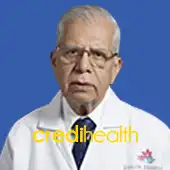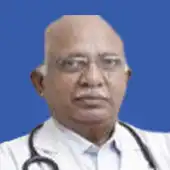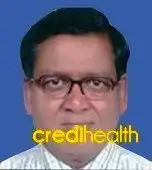Irregular heart rate, or arrhythmia, refers to abnormal heart rhythms that can occur due to various causes. This can include disorders of the heart's electrical system, underlying heart disease, certain medications, or other medical conditions. Symptoms of an irregular heart rate can include palpitations, shortness of breath, dizziness, and chest pain. Treatment options depend on the underlying cause and may include medication, lifestyle changes, or medical procedures.
| Causes | Heart disease, high blood pressure, thyroid problems |
|---|---|
| Remedies | Relaxation techniques, yoga, avoiding caffeine |
| Preventive Options | Healthy diet, exercise, avoiding smoking |
| Treatment Options | Medication, catheter ablation, pacemaker implant |
| Specialist | Cardiologist |
Irregular heart rate, or arrhythmia, is when the heart beats too quickly, too slowly, or irregularly. It is a common heart condition that various factors, including high blood pressure, heart disease, and thyroid problems, can cause. The symptoms of arrhythmia can vary from person to person and can include palpitations, dizziness, shortness of breath, chest pain, and fatigue. There some people may not experience any symptoms at all. Arrhythmias can be diagnosed through an electrocardiogram (ECG). Treatment for arrhythmia may involve lifestyle changes, such as avoiding caffeine and alcohol and medications to regulate the heart rate.
Irregular heart rate, also known as arrhythmia, is a condition where the heart beats irregularly, too fast, or too slow. Here are some examples of conditions where irregular heart rate may come along with other symptoms are given in the following.
Irregular heart rate, also known as arrhythmia, can take on several different forms are given in the following.
| Irregular Heart Rate | Description |
| Atrial fibrillation | It is characterized by rapid and irregular contractions of the heart's upper chambers |
| Atrial flutter | Similar to atrial fibrillation but the heart's upper chambers contract at a regular rate |
| Ventricular tachycardia | The heart's lower chambers, or ventricles, contract too quickly |
| Ventricular fibrillation | The heart's lower chambers quiver instead of contracting, and lead to cardiac arrest |
| Sinus bradycardia | When the heart beats too slowly, typically fewer than 60 beats per minute |
| Sinus tachycardia | When the heart beats too quickly, typically more than 100 beats per minute |
| Supraventricular tachycardia | Originates in the heart's upper chambers and causes a rapid heartbeat |
Irregular heartbeat can be a symptom of some undelying medical conditions. Some of such conditions are as follows
Atrial fibrillation (AFib) is a condition where the heart beats irregularly and often at a faster rate than normal. It occurs when the heart's electrical signals that coordinate the heartbeat are not working correctly. This can lead to blood clots, stroke, and other complications. Common symptoms of AFib include irregular heartbeat, heart palpitations, shortness of breath, and fatigue. Treatment options include medications to control the heart rate, medications to prevent blood clots, and procedures such as catheter ablation or cardioversion to restore a regular heartbeat.
Ventricular fibrillation (VFib) is a serious condition where the heart's lower chambers, or ventricles, quiver instead of pumping blood to the body. This can lead to sudden cardiac arrest, which is a life-threatening emergency. Symptoms of VFib include chest pain, dizziness, and fainting. Treatment for VFib involves immediate cardiopulmonary resuscitation (CPR) and defibrillation to restore a regular heartbeat.
Supraventricular tachycardia (SVT) is a condition where the heart beats abnormally fast, often more than 100 beats per minute. It is caused by abnormal electrical impulses in the heart's upper chambers. Symptoms of SVT include palpitations, chest pain, and shortness of breath. Treatment options include medications to control the heart rate, procedures such as catheter ablation to destroy the tissue causing the abnormal electrical signals, or surgery to remove the tissue.
Long QT syndrome (LQTS) is a rare genetic condition that affects the heart's electrical system. It can cause sudden, irregular heartbeats that can lead to fainting or cardiac arrest. Symptoms of LQTS include palpitations, dizziness, and fainting. Treatment options include medications to control the heart rate, implantable cardioverter-defibrillators (ICDs) to deliver an electrical shock to restore a regular heartbeat, or surgery to remove a portion of the nerve tissue that causes the abnormal heart rhythms.
Heart failure is a condition where the heart cannot pump enough blood to meet the body's needs. It can be caused by a variety of factors, including high blood pressure, coronary artery disease, or heart valve problems. Symptoms of heart failure include shortness of breath, fatigue, and swelling in the legs and feet. Treatment options include medications to improve heart function, lifestyle changes such as a low-salt diet, and procedures such as surgery to repair or replace damaged heart valves.
Cardiomyopathy is a disease of the heart muscle that can cause the heart to become enlarged, thickened, or stiff. It can be caused by a variety of factors, including genetics, infections, and certain medications. Symptoms of cardiomyopathy include fatigue, shortness of breath, and swelling in the legs and feet. Treatment options include medications to improve heart function, lifestyle changes such as a low-salt diet, and procedures such as surgery to remove a portion of the thickened heart muscle.
There are different diagnostic tests that can be used to evaluate an irregular heartbeat or arrhythmia. Here are some of the most common ones are given in the following.
There can be multiple ways to treat irregular heartbeat , including medications, surgery, and home remedies. Each treatment option has its own benefits and drawbacks, and the best course of action will depend on the underlying cause and individual health needs.
irregular heartbeat, can be treated with a variety of medications. Here are five commonly used drugs for the treatment of irregular heartbeat
Amiodarone is a medication used to treat irregular heartbeats such as atrial fibrillation and ventricular tachycardia. It works by slowing down the electrical signals in the heart, which can help to restore a normal heart rhythm. Amiodarone is usually given in a hospital setting, as it can have serious side effects such as lung damage and liver problems.
Diltiazem is a calcium channel blocker medication used to treat atrial fibrillation and supraventricular tachycardia. It works by relaxing the blood vessels and slowing down the heart rate, which can help to restore a normal heart rhythm. Diltiazem is usually taken orally in tablet or capsule form.
Flecainide is a medication used to treat atrial fibrillation and other types of irregular heartbeats. It works by slowing down the electrical signals in the heart, which can help to restore a normal heart rhythm. Flecainide is usually taken orally in tablet form.
Digoxin is a medication used to treat heart failure and certain types of irregular heartbeats, including atrial fibrillation. It works by increasing the strength of the heart's contractions, which can help to regulate the heart rhythm. Digoxin is usually taken orally in tablet form.
Beta blockers are a class of medications used to treat irregular heartbeats, including atrial fibrillation and ventricular tachycardia. They work by blocking the effects of the hormone adrenaline, which can help to slow down the heart rate and restore a normal heart rhythm. Commonly prescribed beta blockers include metoprolol, atenolol, and propranolol. They are usually taken orally in tablet form.
Surgical interventions for irregular heartbeat are typically reserved for cases that do not respond to medications or other less invasive treatments. Here are a few common procedures used to treat arrhythmia
Catheter ablation is a minimally invasive procedure that uses radiofrequency energy to destroy the heart tissue that is causing the irregular heartbeat. During the procedure, a thin catheter is threaded through a blood vessel in the groin or arm and guided to the heart. The catheter delivers heat to the problematic tissue, destroying it and creating scar tissue that can prevent the abnormal electrical signals that cause arrhythmia. Catheter ablation is a low-risk procedure that typically requires only a short hospital stay.
A pacemaker is a small device that is surgically implanted under the skin in the chest to help regulate the heartbeat. It consists of a generator that sends electrical impulses to the heart through leads threaded through the blood vessels. Pacemakers can be programmed to deliver electrical impulses to the heart as needed to maintain a normal heartbeat. They are commonly used to treat bradycardia, or a slow heart rate.
An implantable cardioverter defibrillator (ICD) is a small device that is surgically implanted under the skin in the chest to monitor the heartbeat and deliver electrical shocks to the heart if needed to restore a normal rhythm. It is commonly used to treat ventricular tachycardia and ventricular fibrillation, which can be life-threatening arrhythmias.
There are several lifestyle changes and home remedies that can help to prevent or manage irregular heartbeat. Here are a few examples
Stress can trigger arrhythmia in some people, so it is important to find ways to manage stress. Exercise, meditation, deep breathing, and yoga are all effective stress-reduction techniques.
Being overweight or obese can increase the risk of arrhythmia, so maintaining a healthy weight through diet and exercise is important. Aim for a diet that is rich in fruits, vegetables, lean protein, and whole grains.
Caffeine and alcohol can both trigger arrhythmia in some people, so it is important to limit consumption of these substances.
Smoking can increase the risk of arrhythmia, so quitting smoking is an important step in preventing and managing the condition.
Dehydration can contribute to arrhythmia, so it is important to stay hydrated by drinking plenty of water and other fluids.
It is important to consult a healthcare provider before trying any home remedies or making lifestyle changes, as some arrhythmias can be life-threatening and require medical intervention.
Irregular heartbeat, or arrhythmia, can be prevented through a combination of lifestyle changes and medical interventions. Here are some ways to prevent arrhythmia in detail
Lifestyle changes are an important part of preventing arrhythmia. Here are some examples Exercise regularly Regular exercise can help to maintain a healthy weight and reduce the risk of arrhythmia. Aim for at least 30 minutes of moderate-intensity exercise most days of the week. Eat a healthy diet Eating a diet that is rich in fruits, vegetables, lean protein, and whole grains can help to reduce the risk of arrhythmia. Avoiding processed foods and foods that are high in sugar and saturated fats is also important. Limit alcohol and caffeine Alcohol and caffeine can both trigger arrhythmia in some people, so it is important to limit consumption of these substances. Quit smoking Smoking can increase the risk of arrhythmia, so quitting smoking is an important step in preventing the condition. Manage stress Stress can trigger arrhythmia in some people, so finding ways to manage stress through exercise, meditation, or other techniques is important. Maintain a healthy weight Being overweight or obese can increase the risk of arrhythmia, so maintaining a healthy weight through diet and exercise is important. Medical interventions In some cases, medical interventions may be necessary to prevent arrhythmia. Here are some examples Medications Several medications can be used to prevent arrhythmia, including beta blockers, calcium channel blockers, and anti-arrhythmic medications. These medications work by regulating the heart's electrical activity. Pacemaker A pacemaker is a small device that is implanted under the skin in the chest to regulate the heartbeat. It can be used to prevent arrhythmia in people with bradycardia, or a slow heart rate. Implantable cardioverter defibrillator (ICD) An implantable cardioverter defibrillator (ICD) is a small device that is implanted under the skin in the chest to monitor the heartbeat and deliver electrical shocks if needed to restore a normal rhythm. It is used to prevent arrhythmia in people at high risk of sudden cardiac death. Catheter ablation Catheter ablation is a minimally invasive procedure that uses radiofrequency energy to destroy the heart tissue that is causing the arrhythmia. It is used to prevent arrhythmia in people with certain types of arrhythmias that do not respond to medication.
If you have an irregular heart rate or heart palpitations, it is important to see a doctor. The warning signs are given in the following.
If you are experiencing palpitations and are concerned about your symptoms, it is always a good idea to see a doctor for evaluation and reassurance.
If you have irregular heart rate and are concerned about your health, it is important to seek immediate medical attention from a qualified irregular heart rate doctor. A doctor specializing in treating irregular heart rate, such as a Cardiologist, would be the right health professional to consult.
Here is a list of Top verified doctors for irregular heart rate. You can book an appointment with one to start your irregular heart rate treatment today.

Jaslok Hospital, Mumbai
Rs. 2,500 Consult Fees

CARE Hospital, Banjara Hills, Hyderabad
Rs. 1,000 Consult Fees

Indraprastha Apollo Hospital, Sarita Vihar, Delhi NCR
Rs. 1,800 Consult Fees
A hospital can provide various services to help diagnose and treat your irregular heart rate. If you are experiencing irregular heart rate In that case, it is important to visit a irregular heart rate hospital for a proper diagnosis and treatment plan.
Check a list of Top Hospitals for irregular heart rate treatment.
Multi Speciality Hospital
Established in 1918
🛌345 Beds
.png)
Multi Speciality Hospital
Established in 1940
🛌220 Beds

Multi Speciality Hospital
Established in 1947
🛌230 Beds
Frequently asked questions and answers about irregular heart rate.
Is an irregular heartbeat serious?
An irregular heartbeat can be serious, depending on the underlying cause and the type of arrhythmia. It can lead to complications such as stroke, heart failure, or sudden cardiac arrest.
What cause an irregular heartbeat?
An irregular heartbeat can be caused by various factors, such as underlying heart conditions, high blood pressure, thyroid disorders, electrolyte imbalances, or drug and alcohol abuse.
How do you fix an irregular heartbeat?
Treatment options for an irregular heartbeat depend on the specific type and severity of the arrhythmia, but may include medication, lifestyle changes, medical procedures such as cardioversion or catheter ablation, or the use of implanted devices such as pacemakers or defibrillators.
Reviews by patients on different.
Anandita
My father went for a health check up alone at Kokilaben hospital. He was doing stess test and he developed Anterior wall Myocardial infarction (Major heart attack). Thanks to immediate attention by Dr. Pravin Kahale and his team who took my father immediately for Emergency angioplasty even though we were at home. In a heart attack, every minute delay leads to damage to heart muscle and has long term consequences of a weak heart. My father had good salvage and early prompt action lead to preserve heart pumping. Dr. Kahale is an excellent doctor. He has very deep knowledge. He writes few but best medications. He also makes us understand complex things in simple language. Our entire family would strongly recommend Dr. Kahale as a cardiolgist who can deliver the best in most complex cardiac issues. He is always accessible to the entire family and is only a phone call/ message away and resolves all the queries. Highly recommended!
Ishwar Devi
Artemis Hospital
<p>My mother had a bad chest pain the other day. We decided to get her regular checkup done and approached Credihealth for the same. After a couple of options, we decided to visit Artemis. The overall process was very smooth. The ECG had some abnormality. So we consulted Dr Kuldeep Arora for it. He is one gem of a doctor. He was very friendly to talk to. Very sensitive to my mothers concerns. He explained all the medical reports including ECG. We gained immediate confidence in the doctor. He advised a few additional tests. Those were done on same day. After seeing those reports, he proposed a treatment plan. Considering my mothers age, it was empathetic for him to tell no to any procedure. He recommended meds for 2 months and told us to come back in between. Friendly, sensitive and empathetic. All in all good experience.</p>
Dr. Bhabendra Nath Kalita
Dr. Venkatesh treated my dad with utmost care. Although my dad & his reports were not in station, he eagerly looked into the Angiogram video (done in a different place) of my father in my mobile and suggesting corrective treatments. He patiently advised me many things and repeated them again & again for my better understanding. The operation was done by Dr. Girish and although it was critical, it was successful. Dr. Venkatesh has visited us many times during our stay at the hospital despite his busy schedule to inquire about the wellbeing of my father. During the follow-up visits, Dr. Venkatesh has examined my Dad with utmost details, gave proper advice, and suggested & changed medicine courses to suit my dad's body as he has high blood pressure & diabetics. I wish him great success in his career and love of his patients.
Credihealth is an online healthcare portal for all your hospital appointments, diagnostic test bookings, ordering medications, or homecare services. If you have any inquiries, our in-house medical experts can help solve them and guide you to the best specialist in the India.